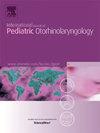在听觉脑干反应测试中,使用褪黑激素诱导睡眠作为全身麻醉的替代
IF 1.3
4区 医学
Q3 OTORHINOLARYNGOLOGY
International journal of pediatric otorhinolaryngology
Pub Date : 2025-10-02
DOI:10.1016/j.ijporl.2025.112587
引用次数: 0
摘要
目的听觉脑干反应(ABR)是一种客观的、非侵入性的听力测试,需要受试者保持静止以获得准确的结果。这给患有神经发育障碍的儿童带来了挑战。传统上,采用全身麻醉(GA),但它有风险,成本高,等待时间长。褪黑素副作用最小,不需要监测,提供了一种潜在的替代方案。本研究评估褪黑激素诱导睡眠作为ABR测试中GA替代方法的可行性和有效性。方法回顾性分析2023年7月至2024年11月在格拉斯哥皇家儿童医院接受褪黑激素诱发睡眠下ABR的52例神经发育障碍儿童。测试前剥夺睡眠和服用9毫克褪黑激素。第一次测试不成功的孩子被邀请进行第二次测试。如果两次尝试都失败,则需要GA。结果在47名参与者中,53%的人在第一次尝试中获得了ABR测试的成功,26.7%的人在第二次尝试中获得了成功。累计61.7%不需要GA。没有发现年龄、性别、合并症和成功率之间有显著的相关性。GA ABR的中位等待时间减少了25.8%,26名儿童从GA等待名单中删除。成本分析显示,与GA相比,使用褪黑激素诱导睡眠每位患者节省43.32%的费用。无论测试结果如何,家长的接受度都很高。结论meltonin诱导睡眠是一种可行且经济的ABR检测方法。尽管成功率相对较低,但它减少了等待时间,降低了成本,并最大限度地减少了对遗传算法的需求。本文章由计算机程序翻译,如有差异,请以英文原文为准。
Using melatonin to induce sleep as an alternative to general anaesthesia in auditory brainstem response testing
Objectives
Auditory Brainstem Response (ABR) is an objective, non-invasive hearing test requiring the subject to remain still for accurate results. This poses challenges in children with neurodevelopmental disabilities. Traditionally, general anaesthesia (GA) was employed, but it carries risks, high costs, and long waiting times. Melatonin, with minimal side effects and no need for monitoring, offers a potential alternative. This study evaluates the feasibility and efficacy of melatonin-induced sleep as an alternative for GA in ABR testing.
Methods
A retrospective review was conducted on 52 children with neurodevelopmental disabilities referred for ABR under melatonin-induced sleep at the Royal Hospital for Children, Glasgow, from July 2023 to November 2024. Pre-test sleep deprivation and a 9 mg dose of melatonin were used. Children with unsuccessful first tests were invited for a second attempt. If both attempts failed, GA was required.
Results
Of 47 attendees, 53 % achieved successful ABR testing on the first attempt, and 26.7 % at the second attempt. Cumulatively, 61.7 % did not require GA. No significant correlation was found between age, sex, or co-morbidities and success rates. Median GA ABR waiting times decreased by 25.8 %, and 26 children were removed from the GA waiting list. Cost analysis showed a 43.32 % saving per patient using melatonin-induced sleep compared to GA. Parent acceptability was high, irrespective of testing outcomes.
Conclusions
Melatonin-induced sleep is a feasible, cost-effective alternative to GA for ABR testing. Despite the relatively low success rates, it reduces waiting times, lowers costs, and minimises the need for GA.
求助全文
通过发布文献求助,成功后即可免费获取论文全文。
去求助
来源期刊
CiteScore
3.20
自引率
6.70%
发文量
276
审稿时长
62 days
期刊介绍:
The purpose of the International Journal of Pediatric Otorhinolaryngology is to concentrate and disseminate information concerning prevention, cure and care of otorhinolaryngological disorders in infants and children due to developmental, degenerative, infectious, neoplastic, traumatic, social, psychiatric and economic causes. The Journal provides a medium for clinical and basic contributions in all of the areas of pediatric otorhinolaryngology. This includes medical and surgical otology, bronchoesophagology, laryngology, rhinology, diseases of the head and neck, and disorders of communication, including voice, speech and language disorders.

 求助内容:
求助内容: 应助结果提醒方式:
应助结果提醒方式:


